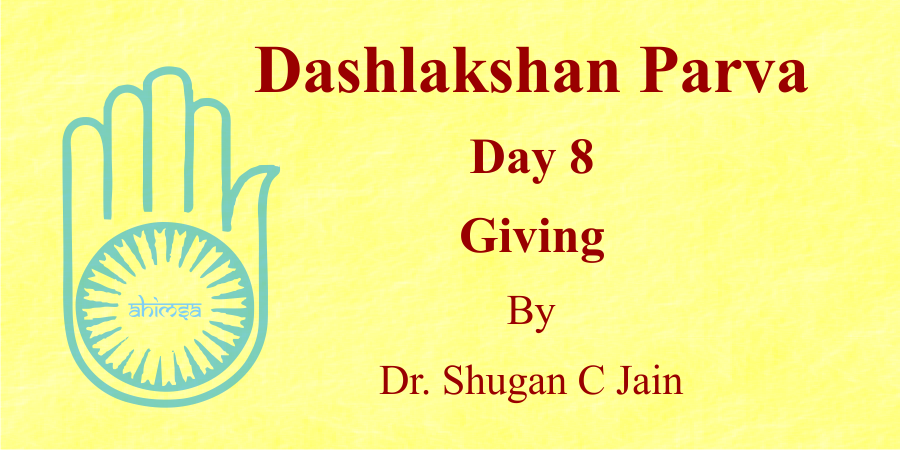Today, we shall talk about giving. Why? Because for the first seven days, we talked about our virtues, some practices to reduce our pain and now the time has come to give away things which we feel cause pain.
Material and psychic things, which we possess, are like chains which bind us with them and obstruct in not letting us know our virtues discussed earlier. They also do not let us enjoy our nature to be happy. Giving up such things is called tyaga/charity/giving/sharing. Only renouncers/ascetics who have renounced their worldly life to pursue spirituality can renounce all worldly possessions to eliminate their psychic possessions (wrong belief, anger, arrogance, deceit, greed, attachment, etc.) for achieving bliss/liberation. We, the householders cannot give up everything and hence practice limiting these possessions by giving or sharing them with others.
For us, the common people, giving starts by putting limits on what to have or a limit to what we shall share. The limits can be very different for different people but putting a limit helps to start the act of sharing. An example is compulsory deduction by employers of salary/profits for charities identified by you. Our holy literature indicates four types of giving (to ascetics and those who need them), namely food for the hungry, medicine or medical help for the sick, implements of knowledge to seekers and protection from fear to all let others enjoy and grow. Everyone has some surplus of one of these four types of possessions to share with others.
Giving/sharing is the best means to achieve peace and happiness in the world as it leads to co- existence and minimising jealousy and animosity. Here giving up/sharing is based on no expectations in return as expectations cause pain. God is love, benevolent and sharing his everything with his children. Teacher gives his knowledge to students and students their gratitude/respect. Family shares its values, love and care with its members. Community shares these with their members and so on. The member who has something more than what s/he needs, shares with other members who need them. Even the richest cannot enjoy serenity in life, if they do not share their prosperity with their weaker brethren. This is a practice of interdependence or co-existence.
Giving does not mean just giving money only. Yes, it is important and essential to let others take care of themselves or of others. The best form of giving is to take care of, to serve others – the virtuous ones as well as the needy and destitute. Just imagine how a lonely person or sick person feels when s/he is attended by someone to spend time, to take care of their problems and to guide them to find solutions to their problem. The campaign run by Rohan to collect money for helping poor students is an excellent example of giving/sharing. Similarly, the money we all donated for Covid patients and the victims or the community health and help camps to raise money for charities are examples of giving. Some wise men have rightly said: ‘In this world it is not what we take but what we give, that makes us rich.’
We need to remember that the state alone cannot do all the welfare activities. Individuals, philanthropists, and compassionate people have done more all over the world than the government. Examples of Bill Gates, Warren Buffet and Tata in India are beacons of charity/philanthropy. Just take a minute and think of some persons in history whom you remember most. I think, the names like Gandhi who gave up all worldly things and served the people to achieve freedom and other similar ones stand out. All religious leaders of the world talk of giving/charity. Do we want to think of Hitler? So, keep in mind to do some charitable work of your choice.
Let us now see how it is practised in different life situations:
In the family: To be forthcoming in serving, or sharing with, other members rather than be demanding always.
In school/college: To offer your services in various educational cum social activities of the college, to help weaker students and so on. To observe discipline concerning studies, outside classroom activities and show respect to teachers. Be considerate with your school/college friends.
Dealing with society, government: Pay taxes and other levies diligently. Participate in various charitable and social camps organized by the community.
Lifestyle: Putting limits on our possessions makes us relaxed and offer time to advance in our career, family and social life. The principle of interdependence helps in building communities and get recognition. You never know, in what form God comes to test your qualities to bless you. I try to avoid repeating as most are common in all virtues and life style practices.

